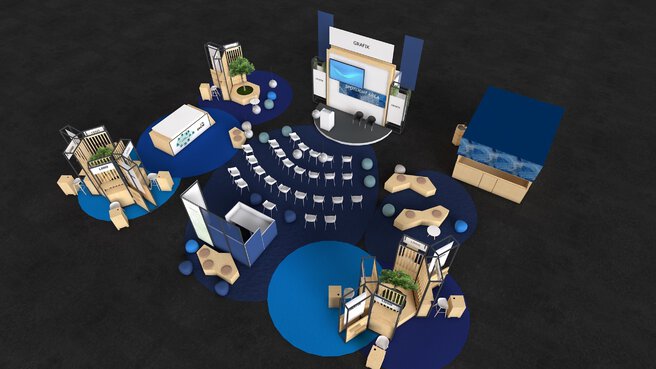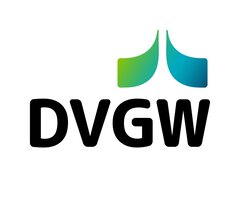Spotlight Area—Hydrogen in the circular economy
Hydrogen in the Circular Economy—New Opportunities and Possibilities for Municipal Hydrogen. The future belongs to sustainable technologies, and hydrogen plays a major role in this. New processes enable emission-free production from existing raw materials such as wastewater, waste or biomass. In addition, exciting examples of innovative applications are waiting to be discovered.

Hydrogen in the circular economy
New processes and concepts enable the CO₂-free production of hydrogen from waste materials such as garbage, biomass, or wastewater, thereby contributing to the development of regional hydrogen ecosystems. For example, the continuously available electricity generated in waste incineration plants can facilitate the marketing of hydrogen from connected electrolysers in the transport sector. Biogas plants also offer potential: modern processes such as steam reforming or pyrolysis can be used to convert raw biogas into hydrogen, which can then be compressed and delivered to end customers. In addition, projects and pilot plants are researching innovative methods for extracting hydrogen from wastewater.
All the innovative processes and concepts show: Hydrogen and hydrogen technologies can be a useful partner for municipal recycling and water management. Read more about hydrogen development in our Industry Insight article.
Discover the Hydrogen Stage Program
Integrated into the Hydrogen Spotlight Area is our Hydrogen Stage: your hotspot for knowledge, exchange, and new partnerships in the future market of hydrogen.
Experience practical insights, visionary technologies, and concrete solutions along the entire hydrogen value chain.
Spotlight Area Hydrogen—At a glance
Spotlight
4 days covering over 300 m² in the attractive Hall A4, all dedicated to the topic of hydrogen.
Exhibitor
Experience up to 10 exhibitors presenting their innovative solutions in our exclusive Spotlight Area Hydrogen. In addition, inspiring best practice examples provide valuable insights into successful implementation in practice. Real success stories which show how pioneering hydrogen technologies are already becoming reality today – and whet the appetite for more.
Hydrogen Stage
The stage will feature exciting ideas, panel discussions, and inspiring presentations. Our stage brings ideas to life and answers the latest questions from industry and local authorities.
What solutions can I find here?
Are you looking for solutions around the topic of hydrogen? Then come and see us.
1. Planning hydrogen plants
2. Solutions for hydrogen production
- using water electrolysis and electricity from waste incineration, biogas plants, or renewable energies
3. Storage and distribution options
- Conversion of gas distribution networks to hydrogen or construction of new H2-ready pipeline networks
- Storage solutions for gaseous energy sources
4. Use and application
- Technologies for the heating market
- Combined heat and power (power plants and CHP units)
- Industrial process heat
5. Circular economy
- Solutions for direct hydrogen production from waste streams, organic residues and waste materials, sewage sludge, non-recyclable waste, etc.
6. Municipal heat planning with climate-neutral gases
- Electrolyzers as an element of municipal sector coupling and decentralized energy supplyInfrastructure for supplying customers with hydrogen






Experience at IFAT Munich...
- Innovative processes for hydrogen production of the future, for example in sewage treatment plants, live in the Spotlight Area.
- The possibilities hydrogen offers for decentralized energy supply.
- How hydrogen can be distributed across the region and delivered to customers.
- How heat can be generated with new gases and where it can be used—for example, in gas-fired boilers or in glass manufacturing.
- How hydrogen can play a role in the municipal circular economy, for example, by generating new energy from waste.
Hydrogen offers municipalities and businesses promising opportunities on the path to climate neutrality. It can be produced using water electrolysis and electricity. This allows renewable energies to be stored and used where molecules are needed rather than electrons. Various water sources can be used for this process once they have been purified, including groundwater and sewage sludge. The hydrogen can be fed into the local distribution network and used, among other things, as fuel for municipal vehicles or as a means of production for industry connected to the grid – in line with a well-functioning circular economy and local energy transition. The DVGW has completed its regulatory work on adapting gas networks to hydrogen and has also developed conversion aids for the industry. The DVGW VerifHy database also provides reliable information on the hydrogen compatibility of components. This makes it possible to transform municipal infrastructure towards climate neutrality. However, in order to fully exploit the potential of hydrogen and make the energy system more resilient, it needs to be firmly established in municipal heat planning as an important building block for coupling energy sectors
As an energy vector and storage, as a basic fuel, but also as a driver of a sustainable transformation of the economy, hydrogen will play an important role in the future. As a strategy and coordination center for hydrogen in Bavaria, the Center Hydrogen.Bavaria (H2.B) supports the numerous innovative companies and research institutions by providing information, advice and national and international networking. In the Hydrogen Alliance Bavaria we unite along the entire hydrogen value chain more than 330 actors with a headquarters in Bavaria and thus form the largest state-initiated hydrogen network in Germany.
Partners
Contact

- EXHIBITION MANAGER

- Exhibition Manager




